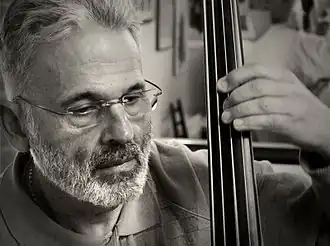Gary Karr
Gary Karr | |
|---|---|
 | |
| Born | November 20, 1941 Los Angeles, California, U.S. |
| Died | July 16, 2025 (aged 83) Victoria, British Columbia, Canada |
| Occupations |
|
| Organizations | |
| Website | www |
Gary Michael Karr (November 20, 1941 – July 16, 2025) was an American classical double bass virtuoso and teacher considered one of the best bassists of the 20th and 21st centuries.[1] In the 1960s, he was a pioneer of making the double bass a virtuoso solo instrument for which new compositions were written. His playing was described as singing "with all the richness of the cello, the warmth of the viola and the agility of the violin".[2] He performed with orchestras worldwide and simultaneously was an influential teacher. He founded the International Society of Bassists in 1976.
Life and career
Karr was born in Los Angeles on November 20, 1941,[1][3] to a family of several generations of bassists. He was not encouraged by them to go into music; in an interview he said that he had no contact with the professional bassists in his family.[4] He was first taught by his grandfather's friend, Uda Demenstein.[1] He attended Fairfax High School.[5]
He studied at the University of Southern California and then moved on to the Juilliard School in New York City. His major teachers included Herman Reinshagen and Stuart Sankey.[1]
Playing
Karr's breakthrough came in 1962, when he was featured as a soloist in a nationally televised New York Philharmonic Young People's Concert, conducted by Leonard Bernstein. On that famous telecast, Karr performed "The Swan" from The Carnival of the Animals by Saint-Saëns.[1]
He then appeared as a soloist with orchestras internationally, including the Chicago Symphony Orchestra, London Symphony Orchestra, London Philharmonic Orchestra, Montreal Symphony Orchestra, Hong Kong Philharmonic Orchestra, Simón Bolívar Symphony Orchestra, Jerusalem Symphony Orchestra, Oslo Philharmonic, Zurich Chamber Orchestra, and with the major orchestras of Australia.[1][6]
Karr premiered works written for him[1] by Vittorio Giannini (Psalm CXX), Alec Wilder (Double bass Sonata, Suite for double bass and guitar), Robert Xavier Rodriguez (Ursa, Four Seasons for double bass and orchestra), and the double bass concertos by Gunther Schuller, Hans Werner Henze, John Downey and Ketil Hvoslef. He recorded Koussevitzky's Double bass Concerto with the Oslo Philharmonic, among 90 recordings.[1] He also made transcriptions and arrangements for his instrument.[1]
Teaching
He taught double bass on the faculties of the Juilliard School, New England Conservatory of Music, The Hartt School, Yale University and Indiana University.[1] He also taught at music schools such as the Halifax (Nova Scotia) Schools Music Program and published a number of instructional books for the double bass, including for beginners.[1][7] When teaching, he focused on each player finding a unique sound on the double bass, and playing with the lyrical emphasis of a singer.[1]
Foundations
In 1967 Karr founded the International Society of Bassists (ISB), an organization devoted to the study, promotion, and advancement of double bass playing around the world. The ISB, with a membership of more than 3,000 double bass performers, teachers, students, and aficionados in more than 40 countries, hosts an international conference biannually to further these goals.[1]
In 2005, Karr donated his primary instrument, the Karr-Koussevitzky bass, to the ISB.[1] This instrument had been given to Karr by Olga Koussevitzky, Koussevitzky's widow, in 1961. It is the intention of the ISB to make this valuable instrument available for use by double bassists worldwide.[8] The Karr-Koussevitzky bass was once believed to have been made by the Amati family and hence it is also referred to as the Amati bass.[9]
The non-profit Karr Double Bass Foundation,[10] which loans instruments to promising young double bassists to assist in their professional development, was established by Karr in 1983.[1]
Personal life
Karr was featured in two BBC documentaries: The Great Double Bass Race in 1978 and Amazing Bass in 1984. After 40 years as a concert artist, he retired in 2001 to Victoria, British Columbia, where he lived with his dog Shin-Ju, and his friend and companion, organist Harmon Lewis, who died on January 11, 2023.[11]
Gary Karr died from a brain aneurysm in Victoria, British Columbia on July 16, 2025, at the age of 83.[12] He also had cancer at the time of his death.[1]
References
- ^ a b c d e f g h i j k l m n o p "Pioneering double bassist Gary Karr has died". The Strad. July 17, 2025. Retrieved July 18, 2025.
- ^ "Instrumentalists: A Singing Bass". Time. July 7, 1968. Retrieved March 23, 2025.
- ^ Heyes, David (November 20, 2021). "Happy Birthday to Gary Karr". International Journal of Music. Retrieved March 23, 2025.
- ^ Mollerup, Laurence. "Up Close And Classical with Gary Karr". ActiveBass (interview). Archived from the original on March 31, 2016. Retrieved May 15, 2012.
- ^ "More Music News: Orchestra Members Set Panel Discussion". The Los Angeles Times Calendar. p. 27. Retrieved September 26, 2022.
- ^ Duffie, Bruce (December 13, 1993). "Interview with Gary Karr". bruceduffie.com.
- ^ "Mr. Karr, Would You Teach Me How to Drive a Double Bass?" austinsviolinshop.com
- ^ Beuerlein, Karin. "Parting Gift". All Things Strings. Archived from the original on April 15, 2008.
- ^ Grissino-Mayer, Henri D.; Deweese, Georgina G.; Williams, Justin A. (2005). "Tree Ring Dating of the Karr-Koussevitzky Double Bass: A Case in Dendromusicology". Tree-Ring Research: 77–86. doi:10.3959/1536-1098-61.2.77. hdl:10150/262640.
- ^ Karr Double Bass Foundation
- ^ "Harmon Lewis". The Tylertown Times. Retrieved November 25, 2024.
- ^ Nossiter, Adam (July 29, 2025). "Gary Karr, Virtuoso Who Elevated the Double-Bass, Dies at 83". The New York Times. Retrieved July 29, 2025.
External links
- Official website
- Gary Karr at IMDb
- Gary Karr discography at Discogs